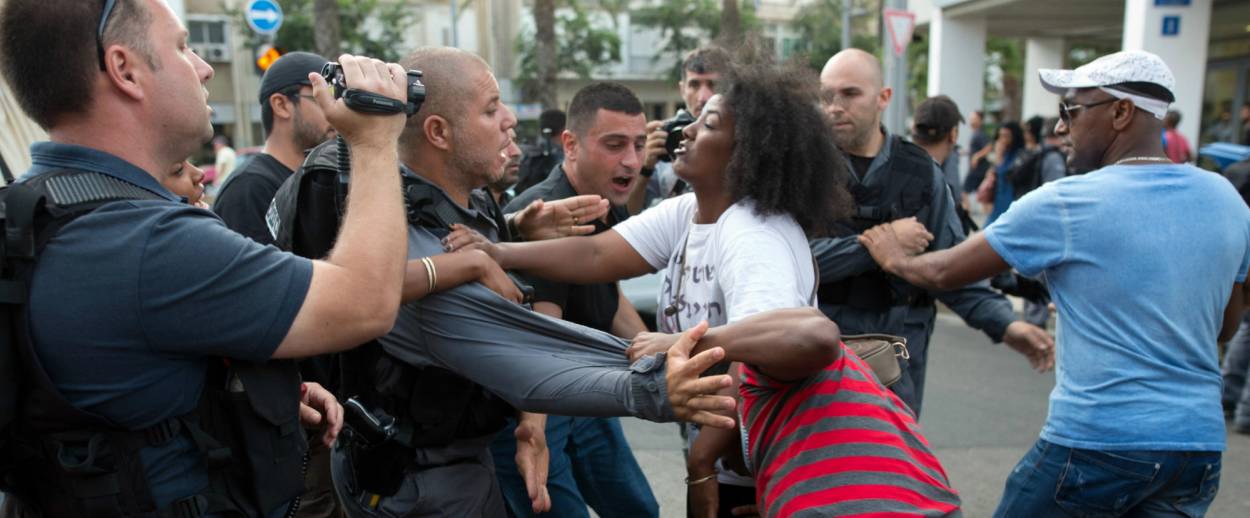Ethiopian Israelis Protest Against Racism and Police Brutality in Tel Aviv
Monday’s demonstrations in the city center grew heated as police reportedly arrested 19 protestors




Ethiopian Israelis in Tel Aviv once again took to the streets on Monday, decrying the racist attitudes of Israeli police towards their community: They were angered by the closing of the criminal investigation into the beating of Ethiopian-Israeli soldier Demas Fekadeh back in April. Israeli police reportedly made at least 19 arrests.
Online, Ethiopian-Israeli soldiers encouraged other Ethiopian soldiers to “abandon the system that has abandoned you,” reported RT. IDF soldiers were urged—against regulations that ban them from attending non-military demonstrations, marches, or parades—to join ranks with their brethren in Tel Aviv. On the ground, a reported 500 demonstrators were armed with chants and slogans, among them: “Violent police should be locked up!” and “We’ve had enough, we’re a new generation!”
Tensions have been slowly brewing between the Ethiopian-Israeli community and authorities in Israel, where an estimated 130,000 Ethiopian Jews live. In 1996 members of the Ethiopian-Israeli community protested when news leaked that Israeli officials oversaw a policy of clandestinely dumping out Ethiopian Israeli blood donations because of fears of the AIDS virus. In 2007, the community rose up to protest against discriminatory school policies towards Ethiopian Jewish children in Petah Tikvah. And in 2012, thousands of Ethiopian Israelis marched in Jerusalem to protest the refusal of housing committees to rent or sell apartments to Israelis of Ethiopian descent.
The latest outrage against the Ethiopian Israeli community occurred on April 27, when Demas Fekadeh, a recipient of an award for distinguished military service from former Israeli president Shimon Peres, was assaulted by police in an unprovoked attacked caught on videotape. In the footage, Fekadeh is seen standing with his bicycle when a police officer appears and tells him to move because the area had been closed off due to investigation of a suspicious object. When Fekadeh doesn’t immediately comply, he is thrown to the ground by the officer and pummeled; a second officer soon joins the assault on Fekadeh.
Fekadeh managed to get away and pick up a stone in his defense, at which point the policemen called for backup. Two additional officers appeared at the scene. The footage shows that Fekadeh did not attack the officers with the rock, but he was nonetheless arrested and held in jail overnight for assault. Fekadeh maintains that the officers declared that they could “do whatever [they wanted]” and that he only picked up the rock to protect himself from one officer’s threat to shoot him in the head. Once the footage of the incident surfaced, the two officers were summarily dismissed with a criminal investigation opened into their actions.
But on June 14, Attorney General Yehuda Weinstein, acquiescing to recommendations from the state prosecutor and the Police Internal Investigations Department that charges be dropped, declared he was ending the investigation. “Justice Ministry investigators,” reported Haaretz, “determined that Fekadeh initiated the clash with the policeman, and that the policeman’s handling of the confrontation was ‘impeccable.’” The decision inspired a protest amongst the Ethiopian-Israeli community who demand justice.
Yet the scenario is bitterly reminiscent of a 2006 incident involving yeshiva student Itamar Biton, the politically well-connected son of a prominent rabbi who intentionally ran over Ethiopian Israeli cashier Noga Zoraish when she stood in front of his car to stop him from leaving a parking lot without paying the $4 fee. Jerusalem District Court Judge Moshe Drori acquitted Biton in 2009 “after receiving a letter from (former Shas party leader) Minister Eli Yishai in the defendant’s favor and out of concern that a criminal record may harm his chances of being appointed a rabbinical court judge,” reported Ynet. Drori himself even went so far as to say that Zoraish had benefitted from the assault—which included hospitalization for serious bruising and a concussion, in addition to a loss of three weeks of work—as the trial had been a “seminal event in her life during which she was finally accepted into Israeli society as an equal.”
Thankfully, Drori’s ruling was overturned by Israel’s Supreme Court in 2009. Hopefully, the efforts of the Ethiopian-Israeli community can force such intervention once more.
Previous: Netanyahu Vows to Fight Anti-Ethiopian Racism
Ethiopian Mass Aliyah to End in August
Watch Israel’s Edgy New Anti-Discrimination Ad
The Last of Ethiopian Jewry Heads to Israel
Fighting Facebook’s Armchair Rabbis
Related: Israel’s Bold New Queen
Israel Says There Are No More Jews in Ethiopia. Thousands Left Behind Disagree.
Unabsorbed
MaNishtana is the pseudonym of Shais Rishon, an Orthodox African-American Jewish writer, speaker, rabbi, and author of Thoughts From A Unicorn. His latest book is Ariel Samson, Freelance Rabbi.